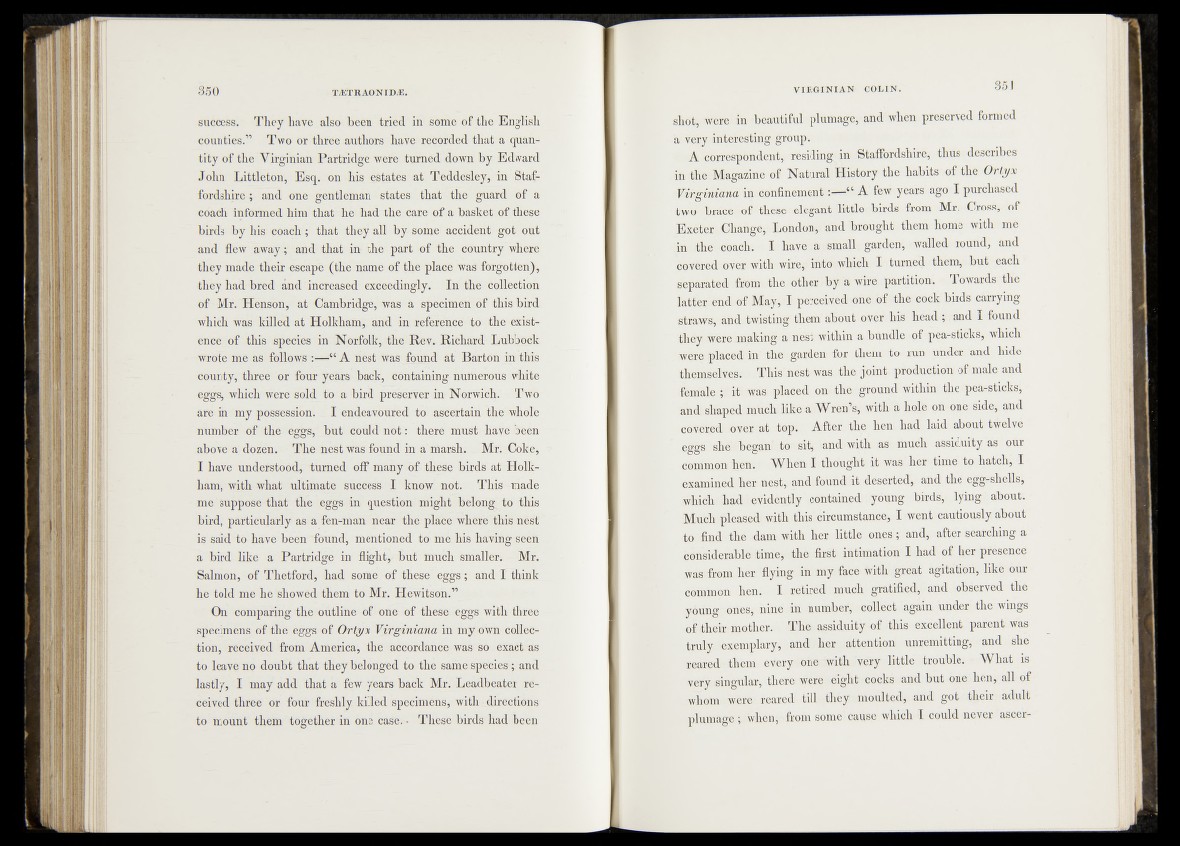
success. They have also been tried in some of the English
counties.” Two or three authors have recorded that a quantity
of the Virginian Partridge were turned down by Edward
John Littleton, Esq. on-his estates at Teddesley, in Staffordshire;
and one gentleman states that the guard of a
coach informed him that he had the care of a basket of these
birds by his coach ; that they all by- some accident got out
and flew iway ; and that in the part of the country where
they made their escape (the name of the place was forgotten),
they had bred and increased exceedingly. In the collection
of Mr. Henson, at Cambridge, was a specimen of this bird
which Was killed at Holkham, and in reference to the existence
of this species in Norfolk, the Rev. Richard Lubbock
-wrote me as follows:*—“ A nest was found at Barton in this
county, three or four years back, containing numerous white
eggs, which were sold to a bird préserver in Norwich. Two
are in my possession. I endeavoured to: ascertain the whole
number of the eggs, but could not : there must haye been
above a dozen. The nest was found in a~ marsh. Mr. Coke,
I have understood, turned off many of these birds at Holkham,
with what ultimate success I know not. This made
me suppose that the eggs in question might belong to this
bird, particularly as a fen-man near the place where this nést
is said to have been "found, mentioned to me his having-seen
a bird like a Partridge in flight,- but much smaller. Mr.
Salmon, of Thetford, had some of these eggs; and T think
he told me he showéd them to Mr. Hewitson.”
On comparing the outline of one of these eggs with three
specimens of the eggs of Ortyx Virginiana in my own collection,
received from America, the accordance was so exact as
to leave no doubt that they belonged to the same species ; and
lastly, I may add that a few years back Mr. Leadbeater received
three or four freshly killed specimens, with • directions
to mount them together in one case.• These birds had been
shot, were in beautiful plumage, and when preserved formed
a very interesting group.
A correspondent, residing^ in Staffordshire, thus describes
in the Magazine of Natural History the habits of the Ortyx
Virginiana in confinément:—“ A few years ago I purchased
two brace of these: elegant little birds from Mr. Cross, of
Exeter Change, London, and brought- them home with me
in the coach. I have a small garden, walled round, and
covéred over with wire, into:which I turned them, but each
separated fröin the otherIby- a wire partition. Towards'the
latter-end of May, I perceived one of the cocfcbirds carrying
straws,- and twisting them about over his head ; .and I found
they were making a nést within a bundle of pea-sticks, which
were placed in' the;-garden for them to run under and hide
themselvesr < ThisLnést was the joint production- of male and
female ; it was placed on- the ground within the pea-sticks,
and shaped much Mke a Wren’s, with a hole oh one side, and
I'-^bverednover at top. After the hen had laid"- about twelvë
ecro-s shei‘! began' to-: sit* ^and^with as much assiduity as our
dommoniien. - When I thought- it was- her time to hatch, 1
examined her nest, and found^it deserted, and the eggrsbells,
which, had,-èsfidéUily contained young birds, lying.*/abouti
Much pleased with this circumstance, I went cautiously, about
to find the dam with her littleKbhéS''; and, after searching a
’ considerable time, the first intimation I had of her presencé
was from her flying in my face Mth' great agitation, like our
commpn hen. I retired much gratified, and observed the
yóiingrr©nes>? nine in number,; collect again under the wings
of -their mother. The : assiduity of this excellent parent was
truly exemplary, and her attention unremitting, and she
reared them every. one 'with -very little trouble. * What is
very singular, there were eight; cocks and but one hen, all of
whom were reared till they moulted, and got their adult
plumage; when, from some’ cafise which I could never ascer